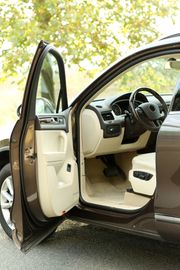
No matter how much the auto industry evolves, new and used cars will always have one trait in common—the necessity of VINs. To most people, the VIN looks like a long, nonsensical sequence of numbers and letters. However, it's a crucial aspect of every vehicle that impacts its ability to operate safely.
What Exactly Is a VIN?
 Standing for "Vehicle Identification Number," the VIN serves as a unique identifier for your specific car, much like a fingerprint does for a human. It’s often found at the bottom of the driver's side of the windshield or dashboard, on the jamb of the driver's door, or occasionally on an engine block or spare tire. Most registration cards, titles, and insurance documents display it, too.
Standing for "Vehicle Identification Number," the VIN serves as a unique identifier for your specific car, much like a fingerprint does for a human. It’s often found at the bottom of the driver's side of the windshield or dashboard, on the jamb of the driver's door, or occasionally on an engine block or spare tire. Most registration cards, titles, and insurance documents display it, too.
Typically, the VIN consists of 17 characters that combine to indicate your vehicle’s manufacturer and features. The characters are broken down in the following pattern:
-
First character: The location where the vehicle was made.
-
Second and third characters: The company that manufactured it. They may also signify whether it has flexible fuel.
-
Fourth through eighth characters: The vehicle’s brand, type, and engine size. The eighth character may also indicate flexible fuel.
-
Ninth character: A security code confirming that the manufacturer authorized the VIN.
-
Tenth character: The vehicle’s model year.
-
Eleventh character: Identifies the plant that made the vehicle.
-
Twelfth through sixteenth characters: A unique serial number.
Used cars that were built before 1981 might have between 11 and 17 characters for their VIN. Anything made after that, however, must have 17. If yours does not and was created after 1981, the vehicle is considered incomplete, and it may need to be recalled.
When Do You Need It?
The VIN helps instantly provide information necessary for creating registrations, getting repairs, complying with recalls, and filing insurance applications and warranty claims. For example, if your used car gets damaged and you take it to an auto service center, the mechanic will use the VIN to figure out the vehicle’s specific features and which replacement parts to order.
Also, when purchasing from a used car dealership, the VIN provides a quick way to look up the vehicle’s history. You can discover whether it’s been involved in accidents or had to be recalled, as well as what repairs it’s needed over its lifespan. That way, you can make an informed purchasing decision.
You’ll never need to worry about missing or invalid VINs when buying a used car at Paniagua Auto Mall in Dalton, GA. Priding themselves on offering honest, fair, and beneficial deals for every customer, they guarantee that only certified pre-owned cars of the highest possible quality are available on their lot. They also arrange financing options to help you get what you need when you need it. For details, call them at (706) 529-1919, or send them a message online.
About the Business
Have a question? Ask the experts!
Send your question

